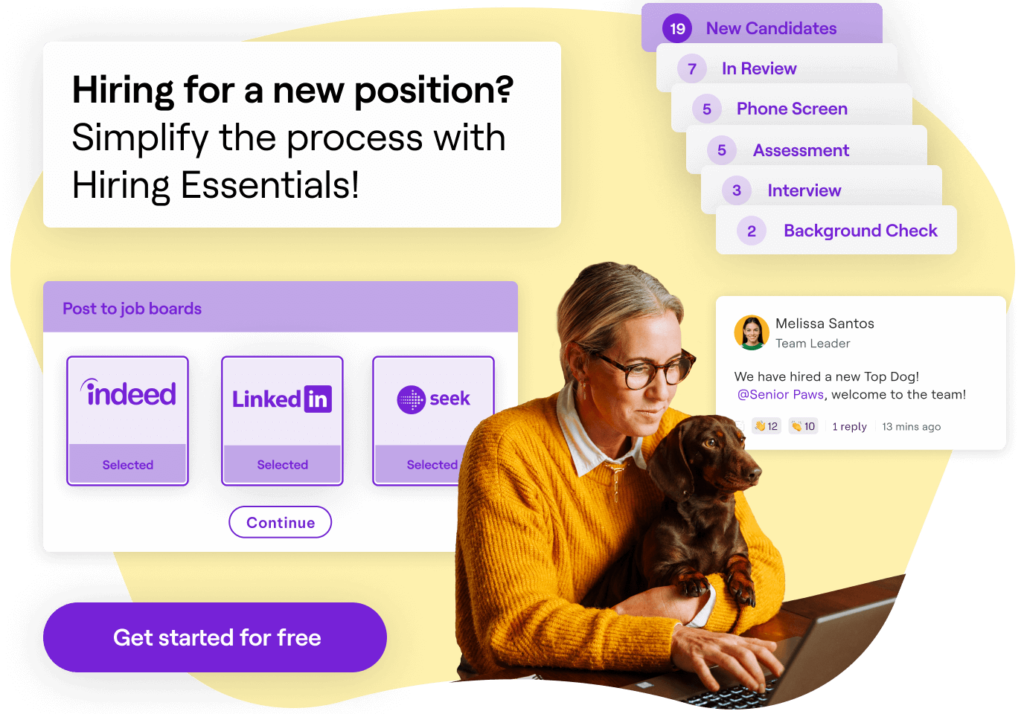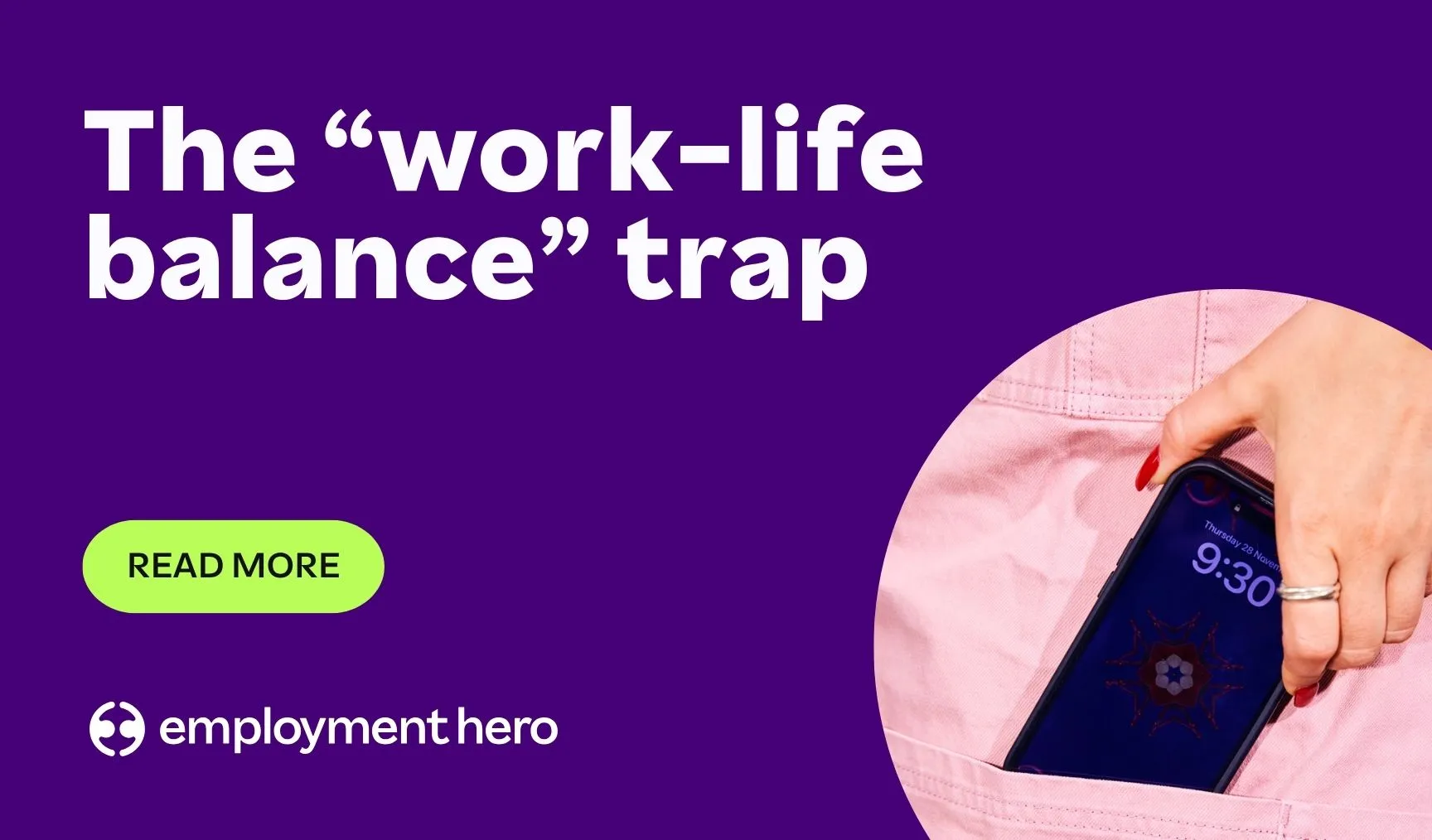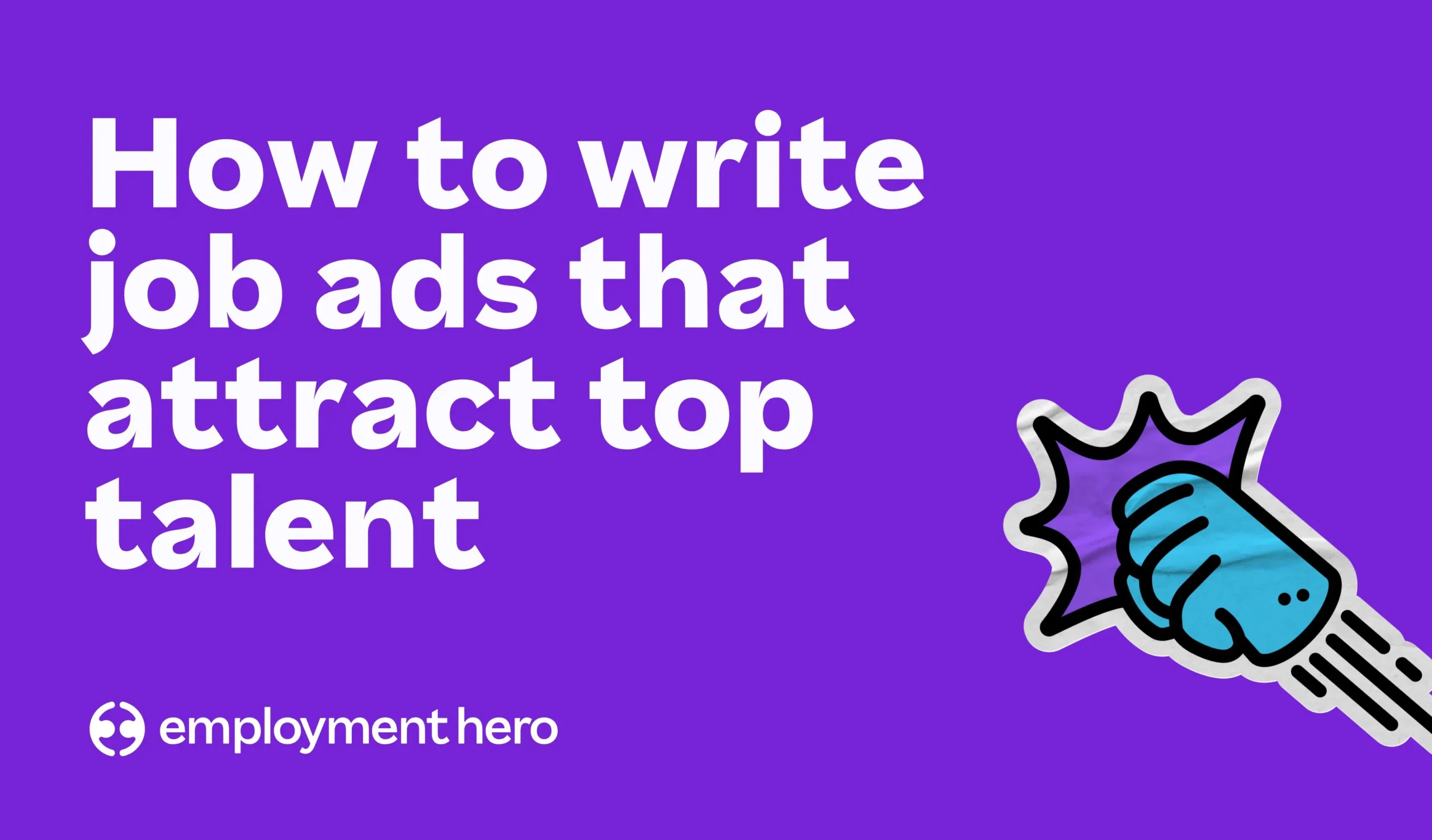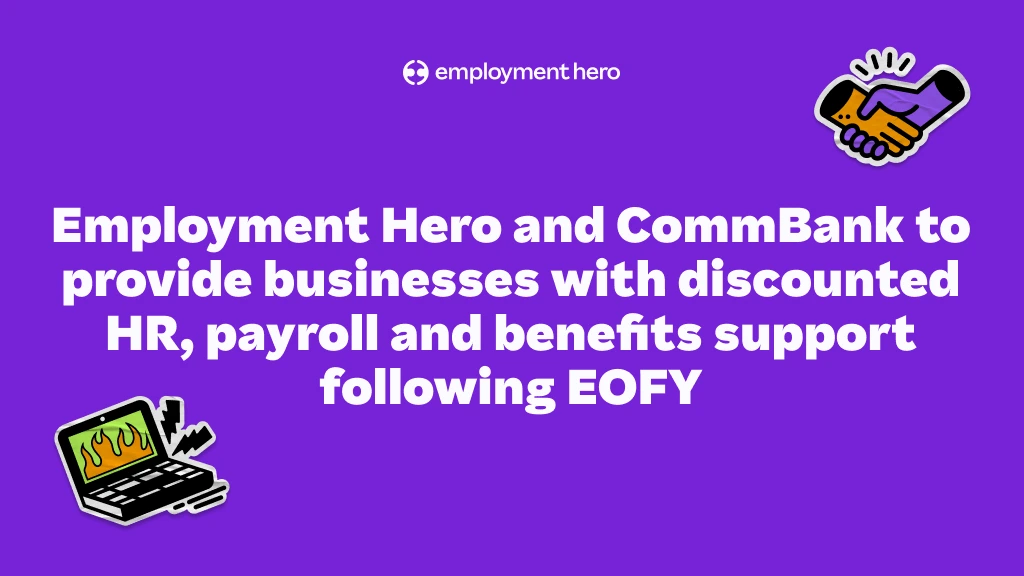What Are Probationary Periods and How Do They Work?
As it’s difficult to gain a completely accurate insight into the person’s suitability from the hiring process alone, this is where the probationary period comes in.

Hiring employees is a challenging process and even more so if you’re new to the game as a small business employer. Let’s face it – finding the right fit is hard.
It’s often a balancing act between identifying someone with the most suitable skills and someone who will be a great cultural fit/add who shares the same vision as the employer. It’s a challenge to find your star candidate, so chances are there will be times when things just don’t work out.
The interview process is only a small glimpse into what an employee is actually like.
As it’s difficult to gain a completely accurate insight into the person’s suitability from the hiring process alone, this is where the probationary period comes in.
What is a probationary period?
Probationary periods provide employers with an opportunity to assess new employees’ suitability, skills and how they fit into your working environment. A probationary period gives both the employer and the employee flexibility at a point where they are still establishing if the role is right for them.
From an employee’s standpoint, the probation period gives them additional time to reflect on the role and decide if an organisation is a right fit for their skills and capabilities.
For both parties, probation is an excellent way to evaluate whether personal and organisational goals, objectives and values are aligned.
Employers are on a probation period too
Don’t think of a probation period as a “get out of jail free card”. This is no one-way street. Yes, you can swiftly terminate employment during this time if your new hire doesn’t meet expectations. But, at the same time, your new hire can just as easily use the probation period as their fast exit from your business.
Remember, you’re on probation too!
What are the benefits of probation periods?
During the probationary period, employers are permitted to terminate an employee’s employment contract without any unfair dismissal implications arising, provided the employee has not yet completed the minimum employment period specified by the Fair Work Act 2009.
Furthermore, provided there are no more generous provisions in an applicable modern award, enterprise agreement, or contract of employment, either party can end employment with a week’s notice within the first year of employment. This allows both employer and employee to move on swiftly.
Preventing unfair dismissal allegations
However, it is important to note that generally, any time employment ends at an employer’s initiative there will be risks.
For example, an employee in their probationary period (or even a prospective employee) can, for example, make a general protections application against an employer or prospective employer if they consider adverse action (such as termination of employment) has been taken against them for a ‘protected’ reason.
For example, this reason could be claimed as the employee exercising a workplace right to take a period of leave or a discriminatory reason such as the person’s age or parental responsibilities.
Therefore, any time an employer is considering ending employment, it is important they follow a procedurally fair process and only dismiss for valid reasons relating to performance or conduct.
As an employer, you’re encouraged to hold regular probationary reviews throughout the trial period to provide recruits with the necessary guidance, support and opportunities to further their career.
This also ensures both parties are aware of what’s required to successfully pass the probation period and any possible issues that need to be addressed. To properly communicate expected learning and performance goals during probation, all new employees should undergo a thorough induction process.
Why are probation periods important?
Probation is an effective means to measure performance and quality of hire using talent acquisition metrics. For an employee to be considered a quality hire, their performance and tenure must exceed the value required to source, train, and develop their skills.
Quality-of-hire metrics are highly useful in understanding the effectiveness of your company’s hiring processes. If we look at the quality-of-hire on a very basic level, it involves analysing whether the costs to recruit and hire someone are higher than the value returned by that individual.
Once they have passed their probation period, a new hire is no longer expected to meet the foundational criteria for quality.
You should also bear in mind that the value an employee delivers to your business will vary from person to person. The longer an employee is with your organisation, the longer they have to contribute to value creation.
How long are employee probation periods?
The most common length of probationary periods can range anywhere from three to six months in Australia. However, it is ultimately up to you how long the period extends. The exact time frame should be specified in an employee’s employment contract.
Making a probationary period longer than this will leave your business open to an unfair dismissal claim if you terminate an employee after the minimum employment period.
This is generally why employers will match the length of an employee’s probationary period with the relevant minimum employment period. A lengthy probation period can also turn off highly talented individuals from considering employment at your business.
What is the minimum employment period?
If you choose to dismiss an employee on probation, be mindful of the minimum period of employment. The minimum employment period commences at the same time at the beginning of an employee’s tenure and extends to either six or twelve months based on the number of employees the business has.
If an employee has worked long enough to surpass this time frame, they are entitled to make an unfair dismissal claim against your company.
The Fair Work Act 2009
Under the Fair Work Act of 2009, a company with less than fifteen employees in total (including any ‘associated entities’) has a minimum employment period of twelve months. For businesses with fifteen or more, the period is half that amount of time (six months).
Therefore, you run the risk of exposing your business to an unfair dismissal claim should you choose to terminate an employee’s employment after their minimum employment period – regardless of whether they are still within their contractual probationary period.
In the interest of mitigating risk of an unfair dismissal claim, it is best that the employer address any concerns they may have with an employee’s performance or conduct prior to the end of the employee’s minimum employment period.
However, as mentioned above, it is important to keep in mind there are other claims an employee can make, regardless of their tenure with the business, so it is always important to follow a procedurally fair process and base any decision to dismiss on valid reasons relating to performance or conduct.
Employee entitlements on probation
It’s vital to remember that employees on probation periods are still entitled to the same entitlements as any other employee of the business. This includes notice of termination (or payment in lieu) and any accrued but unused annual leave hours.
If the employee proves to be successful during their probation, you can decide whether to increase their salary or rate of pay.
Can you terminate an employee during the probation period?
An employer can always choose to terminate an employee’s employment. However, to do so with minimum risk, prior to doing so it must have followed a procedurally fair process and be basing its decision on a valid reason relating to the employee’s performance or conduct.
Despite the fact that a probationary period does make termination easier in some ways, there are still some formal steps you should take to minimise risk to the business.
When ending an employment contract whilst on probation, you must still act fairly and provide a valid reason. You may also be asking, ‘Do I have to give notice?’ Yes, each employment contract differs but it is essential that you give your employee notice of termination.
The minimum period of notice an employer must provide an employee is set out at section 117 of the Fair Work Act 2009. However, there may be more generous provisions contained in an applicable modern award, enterprise agreement or the employee’s contract of employment.
At the least, if you are terminating employment within the minimum employment period, you should ensure you provide the employee with a termination letter.
This is where you can clearly outline the valid reason for terminating the employment and the notice period provided, along with any additional information such as any additional entitlements upon termination, and the employee’s end date.
Can employees resign during the probation period?
Yes. Just as you can terminate employment, employees are entitled to resign at any time. They may realise that the job doesn’t suit them or that they don’t fit the workplace environment.
Full-time and part-time employee resignation notice period
Section 117 of the Fair Work Act does not require employees to provide notice of termination. However, an applicable modern award or enterprise agreement, or contract of employment may require a permanent employee to provide notice.
Casual employee resignation notice period
Due to the nature of casual employment, an employer is not required to provide a casual employee with notice of termination. Likewise, a casual employee is not required to provide an employer with notice.
However, this does not mean any decision to dismiss should not follow a procedurally fair process and be based on a valid reason.
Reasons for employee resignation during probation periods
There are many reasons that may cause an individual to want to resign during this period of employment.
Some factors may include:
- The workload is more than they can handle.
- The work isn’t engaging, challenging or what they signed up for.
- Workplace culture is not enjoyable and colleagues may be hard to get along with.
- They want to spend more time working on family responsibilities and the hours just aren’t flexible enough.
- The company is unethical or did not live up to the expectations agreed upon.
5 tips for managing a new employee in their probation period
1. Define clear expectations in the employment contract
Set out performance and learning goals when you send over the new employment contract to the employee. By clearly managing the expectations, you provide certainty to your new employee as to what they need to achieve to pass the probation period.
2. Regularly review employee performance
Regularly check in with your new hire to get a real sense of how they’re progressing. This gives your new employee every opportunity to raise questions about the business and their role.
At the same time, you get to see their attitude and personality up close which will help you make a call on whether they’re a good fit with the other staff members and your company culture.
3. Assign real work
It sounds obvious, but if you don’t give your new hire suitably challenging work during their probationary period, how can you possibly assess whether they are right for the role?
4. Provide mentoring
By providing a mentor you can help new employees better get used to your company’s working environment. With ready access to an experienced colleague, they know who to turn to for advice, information and support. This helps improve their self-confidence and ability to meet expectations.
5. Share company culture
Remember, this is your opportunity to impress your new starter so that they feel like they’ve made the right decision to join your company. Immerse new hires in your company culture, values and mission.
Show off your company as a fun and productive place to work, where personal development and training are considered a high priority.
What happens when the probationary period ends?
Before the end of the probationary period, you must make a decision as to whether you want to offer ongoing employment, extend their probationary period or, if the circumstances warrant, terminate their employment.
If you want guidance on how to approach successful and unsuccessful probationary periods, we’ve got a template to get you started.
When you decide to terminate the employment based on unsatisfactory performance during the probationary period, managers must put it in writing and state all reasons which led to this decision. If you are unsure about the process, the advice of an employment lawyer may be of use.
How can I extend the probationary period?
If you are considering an extended probation period, we recommend you foreshadow this in your contracts of employment. For example, an employee may have an initial three-month probationary period, and the agreement may state that this period can be extended for an additional three months.
There are also a number of external factors like the minimum employment period which must be taken into consideration.
At the end of the day, if an employee has worked beyond the minimum employment period, the probation period is no longer effective in protecting you from the risk of an unfair dismissal claim if you decide to end employment.
The wrap-up
Probation is an effective way for both employers and employees to assess a particular role and determine whether they can be of value to the business. It’s also a good method for checking whether you’ve got the right person for the job.
Getting help with probationary periods and doing all you can to ensure new starters pass their probationary periods with flying colours is just the tip of the HR compliance iceberg.
Disclaimer: The information in this article is relevant as at 18 July 2022, and has been prepared by Employment Hero Pty Ltd ABN (11 160 047 709) (Employment Hero). The views expressed herein are general information only and are provided in good faith to assist employers and their employees. The Information is based on data supplied by third parties. While such data is believed to be accurate, it has not been independently verified and no warranties are given that it is complete, accurate, up to date or fit for the purpose for which it is required. Employment Hero does not accept responsibility for any inaccuracy in such data and is not liable for any loss or damages arising either directly or indirectly as a result of reliance on, use of or inability to use any information provided in this article.
Related Resources
-
 Read more: The ‘work-life balance’ trap: Why promising it is hurting your SME recruitment (and what to promise instead)
Read more: The ‘work-life balance’ trap: Why promising it is hurting your SME recruitment (and what to promise instead)The ‘work-life balance’ trap: Why promising it is hurting your SME recruitment (and what to promise instead)
For growing SMEs, work-life integration is a sustainable way to support your team and attract top talent. Explore how your…
-
 Read more: Job ad guide: How to attract top candidates
Read more: Job ad guide: How to attract top candidatesJob ad guide: How to attract top candidates
Looking to hire your perfect match? The way you pitch your open role can be the difference between landing or…
-
 Read more: Employment Hero and CommBank to provide businesses with discounted HR, payroll and benefits support following EOFY
Read more: Employment Hero and CommBank to provide businesses with discounted HR, payroll and benefits support following EOFYEmployment Hero and CommBank to provide businesses with discounted HR, payroll and benefits support following EOFY
Eligible CommBank Yello for Business customers will get the first 3 months free on any Employment Operating System subscription with…






















